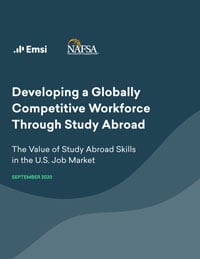Download full report
Download executive summary for international educators
Download executive summary for U.S. policymakers
Download executive summary for business leaders
International education and education abroad contribute to the continued success and vibrant nature of the United States in countless measurable and immeasurable ways. Those who have worked in international education or who have studied abroad themselves understand the profound impact such an experience can have on a student’s academic and professional career, but it can often be difficult to quantify in tangible ways.
To address this, NAFSA partnered with Emsi, a U.S.-based global labor market consulting firm now known as Lightcast, to produce a report measuring the impact of education abroad on workforce development in order to demonstrate international education’s value to the U.S. labor market. Emsi analyzed hundreds of millions of U.S. job postings and professional profiles to determine the connection between study abroad and employer-desired skills.
NAFSA held a special virtual panel discussion on October 27, 2020 to discuss the results of the new report. Download the transcript.
Developing a Globally Competitive Workforce Through Study Abroad: The Value of Study Abroad Skills in the U.S. Job Market builds upon previous studies in skills development and study abroad. It reiterates that students acquire and develop skills during their study abroad experiences that are valued by employers. Students develop communication, leadership, problem solving, and time management skills during study abroad, and these so-called “soft skills” are necessary in many industries and occupations.
The report findings show that in 2019:
- More than 31 million job openings required skills that a student acquires while studying abroad;
- Employers spent more time seeking qualified applicants for these positions vs. the average job opening;
- Employers and job seekers recognize that skills developed during study abroad are essential for management and leadership positions; and
- Professional profiles that highlight the key study abroad soft skills included a higher number of people holding positions as presidents and CEOs than those without those skills.
The findings are further evidence of the incredible value of an international education and why every U.S. student should have the opportunity to study abroad. Unfortunately, even before the COVID-19 pandemic, far too few students participated in study abroad. Only 10% of students study abroad before they graduate, meaning that 90% of graduates are entering the workforce without the global skills, knowledge, and experiences that will position them for success in the global economy. This is why NAFSA has long advocated for the development of a national study abroad program through passage of the Senator Paul Simon Study Abroad Act.

